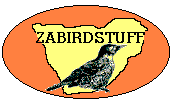

The Joys of Birdwatching - twitching, ticking and other mad stuff !
Twitching and ticking | Powerbirding | Home
Why look at birds ?
1. Birds are the most beautiful and accessible animals on earth. Birds are literally everywhere, and if one appreciates nature, one cannot but appreciate birds. There is almost nowhere where you cannot find birds !
2. There are a tremendous variety of birds. Worldwide there are 9730 different species. Birds exhibit a vast array of different behaviours, including many which humans can relate to. Many birds are sociable and exhibit a remarkable range of adaptive behaviours. Even some of the more common species (for example the Arrowmarked Babbler) have habits which bird scientists (Ornithologists) are only beginning to understand.
3. Bird-watching takes one to many of the most beautiful and wonderfully atmospheric places on earth. If you want to meet someone who has seen the country, and knows every hidden treasure - just find an obsessive birder. Quite apart from Forests and Mountains, Bushveld and Vleis, some of the most sought after birds are found out in the open ocean, in remote river valleys, close to famous waterfalls or even at the Big Hole of Kimberley !
What exactly is Birdwatching ?
It may be exactly that - watching birds. More generally birdwatching is actually about observing and identifying the birds around us. Once one has noticed a bird and seen how it behaves the next question is : What is it ? This is where birdwatching (as most people enjoy it) starts. The next step is a pair of binoculars to help get a better view of the birds you see, as well as a field-guide or reference book to help with identification. Birding has grown enormously in popularity over the last few years and a look at the shelves of your local news agency gives an indication of how much interest birds now generate in Southern Africa.
What is the appeal of Birdwatching ?
Birdwatching has grown in appeal alongside a whole host of other outdoor activies. It is generally a leisurely and relaxing hobby which fulfils our natural curiosity and desire to learn as well as meeting the need to challenge oneself. While people birdwatch for many different reasons some of the attractions of birdwatching are as follows:
Keeping Lists (or ticking)
Once one had got into the fun and challenge of identifying birds, the next step is to keep some sort of record of what you have seen. This is where listing starts, and for most birders the most important list is a lifelist - a list of all the birds seen in ones lifetime. But listing is far more than just about a lifelist, it is a way of keeping track of observations, or of organising a vast number of experiences and ensuring that they are not lost. Listing is given particular meaning and value when it is part of an organised "scientific" effort to gather information. The Southern African Bird Atlas Project involved thousands of birdwatchers who collected millions of bits of data and built up a comprehensive picture on the distribution and movement of most of our bird species.
Once one has got into building up a life list, you then become a twitcher.
A twitcher is someone who actively seeks out new birds to put on their
lifelist and the word is supposed to describe the uncontrollable spasms
of excitement when seeing a new bird for the first time. Most birders are
twitchers to some extent, but the degree to which the ticking of new species
is important is a personal thing. Some birders can be described as "hart-core"
twitchers, and are interested in nothing other than ticking new species.
Twitching has led to a whole vocabulary to describe what happens when you
go twitching. "Gripping" a bird means that you "got it"
- you can add it to you life list. Conversely when you go looking for birds
and miss out on something you should have seen then you "dipped out"
on that species.
Most birders still enjoy seeing birds they have already seen. Birdwatching
which is not oriented towards "twitching" (not about new species)
is usually more leisurely, unless when it becomes power-birding.
Both power-birding and twitching have leant themselves to the use of a
whole range of techniques for finding birds. One of these is the use of
tape-recorded calls. Birders need to remember that birds are wild animals
and disturbance should be kept to a mimimum. Familiarity with a code of
conduct for birders is a good idea.
Go to ABA CODE of conduct for Birders !